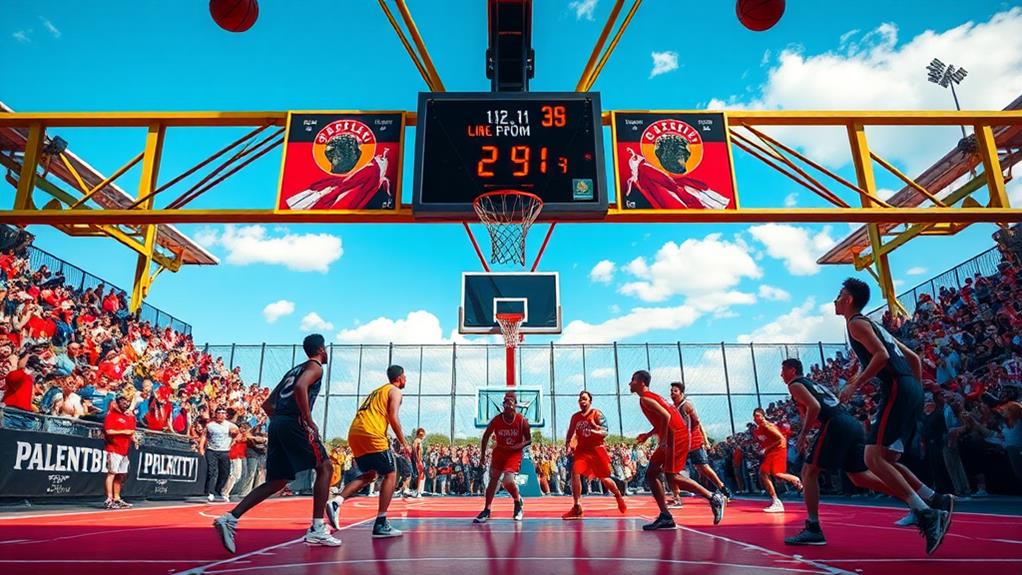
The Rules and Strategies of 21: A Popular Basketball Game
September 26, 2024In the game of 21, you focus on scoring exactly 21 points using skill and strategy. Start by taking your first shot from the top of the key; if you hit the rim, you're in. Score 1 point for free throws, 2 points for shots within the arc, and 3 for beyond it. When you miss free throws, you'll need to clear the ball past the three-point line before scoring again. Watch out—scoring over 21 resets your score to 11 or 15! With practice and smart tactics, you can enhance your gameplay experience. There's so much more to explore.
Overview of 21 Basketball
21 Basketball is an exciting street game that pits players against each other in a race to score exactly 21 points. In this game, you'll experience a unique scoring system where baskets made inside the three-point line earn you 1 point, while those from beyond it score 2 points. Free throws also add an extra point to your tally.
The game starts with players at the top of the key, and the player who first hits the rim gets the initial shot attempt. This fast-paced game not only enhances individual skills but also fosters a sense of community, similar to the engagement seen in soccer-related content.
The competitive nature of 21 basketball shines through its rules. Defensive play is only permitted by the last player to miss a shot, which encourages players to hone their individual skill development. This dynamic creates an engaging atmosphere where every shot counts, and strategic play becomes essential.
Moreover, the game dynamics can be adjusted based on player preferences, adding variety to the experience. Whether you're playing casually or looking to up your game, 21 basketball offers a fantastic way to enjoy the sport while focusing on personal growth and competition.
Jump in, adapt the rules, and enjoy the thrill of chasing that elusive 21 points!
Basic Rules of 21
In the game of 21, scoring is straightforward: you earn 1 point for baskets inside the three-point arc and 2 points for those outside.
Understanding the rules can provide a strategic advantage by allowing players to maximize their scoring opportunities.
You'll start at the top of the key, and the first player to hit the rim gets to shoot first.
Scoring Mechanics Overview
Scoring in the game of 21 basketball usually revolves around a few key mechanics. Each player can score points in different ways: 1 point for free throws, 2 points for baskets made inside the three-point arc, and 3 points for shots taken beyond the three-point line. Your goal is to reach exactly 21 points; if you exceed this total, you'll drop back to 11 points, so be careful when taking shots.
When you make a successful shot, you get to keep shooting. However, if you miss, you must clear the ball past the three-point line before attempting again. This rule adds a strategic element to the game, as you have to be mindful of your shots.
Additionally, if you make three consecutive free throws, you earn the chance to attempt a shot from the three-point line.
Keep track of your points and your opponents' scores throughout the game, as this will help you stay competitive. Understanding these scoring mechanics will enhance your gameplay and increase your chances of winning in 21 basketball.
Game Start Procedures
Before diving into the action, players need to understand the game start procedures for 21 basketball. The game kicks off with everyone positioned at the top of the key. The first shot is essential—it's determined by which player hits the rim first. That player earns the right to take the initial shot from the three-point line, while the others scramble to rebound.
Scoring points is straightforward. Baskets made inside the three-point arc count for 1 point, while those made from beyond it score 2 points. If a player successfully makes a 2-point shot, they can take up to two free throw attempts afterward, with each free throw worth 1 point.
However, if they miss their free throws, players must clear the ball past the three-point line before attempting to score again.
Understanding these game start procedures guarantees a smooth and competitive environment. So, remember to focus on that first shot and be ready to capitalize on your scoring opportunities. Good luck, and may the best player win!
Gameplay and Scoring Mechanics
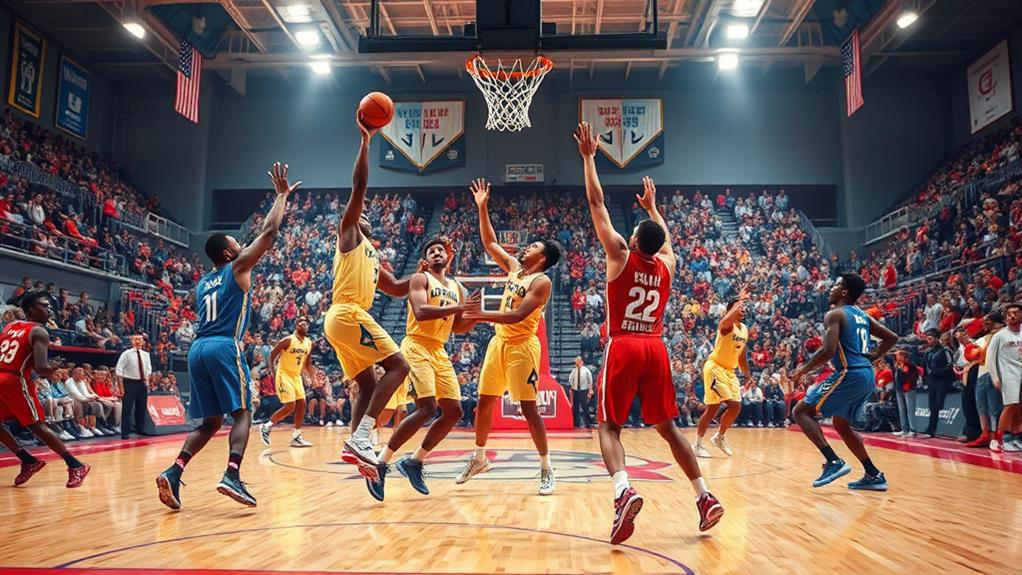
Mastering the gameplay and scoring mechanics of 21 basketball is essential for any player looking to excel in this fast-paced game. You start by attempting a shot from the three-point line; if you make it, you earn 3 points and keep possession for your next shot. Scoring mechanics are straightforward: free throws give you 1 point, field goals inside the three-point arc grant you 2 points, and those beyond the three-point line earn you 3 points.
Understanding the importance of field dimensions and equipment requirements can also enhance your performance on the court.
After any missed free throw, you must clear the ball past the three-point line to regain possession and continue your turn. Be cautious, though—if you exceed 21 points, your score resets to 11, adding strategic pressure to hit exactly 21 points to win.
Additionally, gameplay can vary with house rules that may adjust the point values for shots or impose penalties for missed attempts, making each game unique.
These rules not only enhance competitiveness but also require players to adapt their strategies based on the specific variations in play, keeping the excitement alive.
Scoring Variations and Adjustments
Variations in scoring can greatly change the dynamics of a 21 basketball game. Standard scoring awards 2 points for shots made inside the three-point line and 3 points beyond it, with free throws worth 1 point each.
However, players often implement scoring variations to spice things up. For instance, you might agree to make field goals worth only 1 point, while free throws earn 2 points, adding a unique challenge to each shot made. This adaptability in scoring mirrors the way teams analyze impact of analytics to optimize their strategies for better performance.
Another common adjustment is resetting scores if a player exceeds 21 points, dropping them back to a specified score like 11 or 15. This keeps competitive play alive and encourages strategic decision-making.
You might also face a situation where, after making three consecutive free throws, you have to shoot from beyond the three-point line, increasing the stakes and difficulty.
Additionally, allowing a missed winning shot to lower a player's score to 15 adds yet another layer of suspense. These scoring variations and adjustments not only elevate the intensity of the game but also require players to constantly adapt their strategies, ensuring that every match remains engaging and unpredictable.
Defensive Strategies Explained
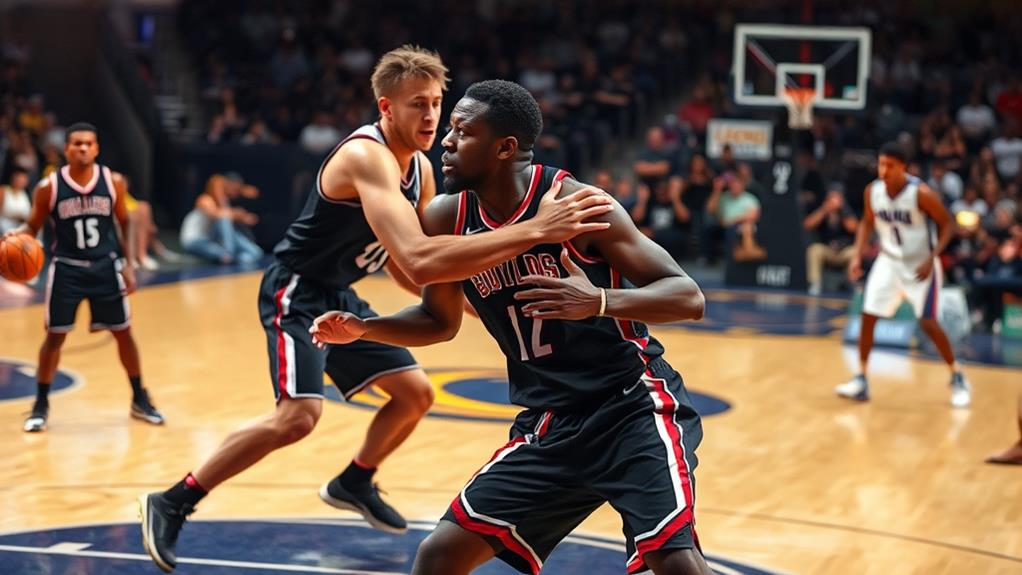
In 21 basketball, effective defensive strategies are essential to gaining an edge over your opponents. Since only the last player to miss a shot plays defense, you must master strategic positioning and timing. Focus on rebounding rather than solely guarding the shooter, as this aligns with fundamental principles of defense, such as pressure and cover. Securing the ball opens up immediate scoring opportunities, making your defensive play a significant part of your strategy.
When playing, be aware of any variations that restrict defensive play near the paint. This means you should position yourself outside the key area, ready to contest shots while still being in a good spot for rebounds.
Communication with your teammates is important; discussing defensive rules and strategies can enhance your gameplay experience and lead to better overall performance.
Keep an eye out for fouls, as players or observers may call them on particularly egregious actions. Maintaining fairness and sportsmanship is key in 21 basketball, so always be mindful of your movements.
Playing With Different Player Counts
When you're playing 21 basketball with just two players, you'll really focus on honing your individual skills as you take turns shooting and rebounding. This mirrors the dedication seen in the careers of influential figures like pioneering legend Nera White, who mastered her skills to dominate the game.
As more players join the game, strategies shift to include teamwork and communication, all while still competing for points. Understanding how these dynamics change can help you adapt your gameplay and enhance your overall experience.
Two-Player Dynamics
Playing a two-player game of 21 offers a unique dynamic that emphasizes individual skills and strategies. With just two players, you'll alternate shooting, making each turn vital. The first successful shot gives you a chance to take free throws, which can greatly boost your score. This setup requires you to be strategic in both your offense and defense since there are no teammates to rely on.
As you and your opponent gauge each other's shooting abilities, you'll likely adjust your shot selection and defensive positioning. Effective communication about house rules and scoring variations is fundamental to guarantee you're on the same page, creating a fair and enjoyable experience.
The competitive nature of the game shines through as you develop your individual skill, particularly in shooting and rebounding after missed shots. Each miss is an opportunity to improve your defense and anticipate your opponent's next move.
The focus on individual performance in a two-player game not only sharpens your skills but also heightens the thrill of competition, making every point scored a reflection of your strategic choices.
Multi-Player Strategies
Expanding the game of 21 to include multiple players adds layers of complexity and excitement. Each player competes individually, which means you need to adapt your strategies based on how many opponents are on the court.
With three or more players, positioning becomes essential. Anticipate where the ball will land, as the last player to miss usually takes on the defensive role, opening up new shooting opportunities for you.
In larger groups, consider forming temporary alliances to enhance your scoring chances, but remember that the goal is to reach 21 points first. Communication is critical here; clarify rule variations and scoring methods to guarantee everyone's on the same page.
When playing with only two players, the focus shifts to direct one-on-one play, emphasizing individual skill and shot accuracy.
Regardless of the player count, competition for rebounds intensifies, so stay aware of your opponents and their strategies. Always keep an eye on the score and adjust your gameplay accordingly.
Tips for New Players
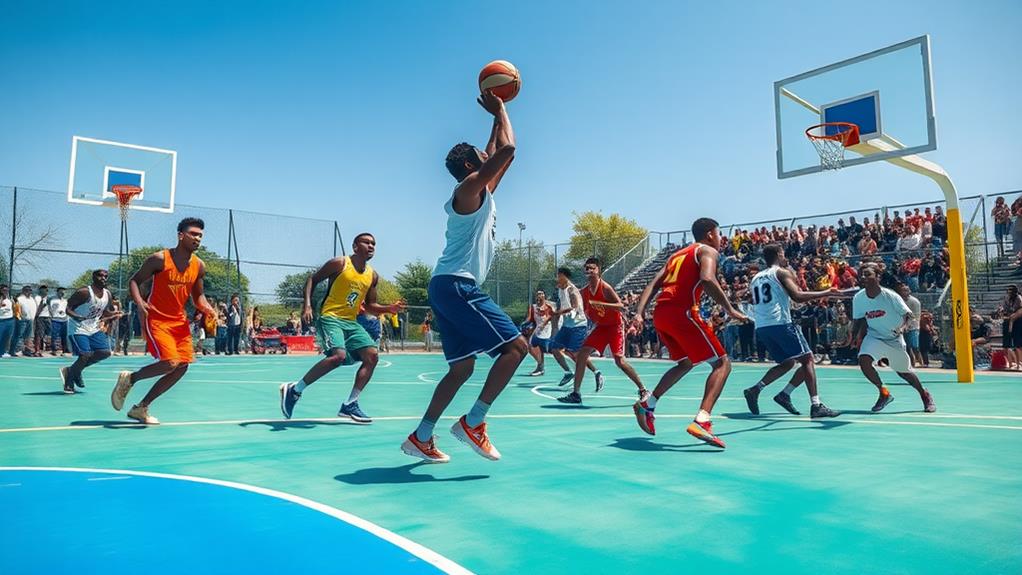
To succeed in the game of 21 basketball, you should start by mastering the basic rules. Understand that you score 1 point for free throws, 2 points for shots inside the three-point line, and 3 points for shots beyond the arc. This knowledge will enhance your gameplay.
Regular practice is essential—work on your shooting skills to improve your accuracy, as consistent shooting helps you rack up points quickly. Additionally, embracing the YMCA's principles of teamwork and respect can enrich your playing experience, as the sport promotes physical activity alongside fair play.
Before you play, communicate with other players about any house rules or scoring variations to guarantee everyone's on the same page. This promotes fair play and a smoother game.
Observe experienced players to learn effective strategies and positioning; watching how they move and make decisions can greatly improve your own gameplay.
Lastly, maintain a positive attitude throughout the game. Enjoying the competitive spirit not only makes the experience more enjoyable for you but also fosters good vibes among fellow players.
Importance of Skill Development
In 21 basketball, you'll see significant improvement in your individual skills as you focus on dribbling, shooting, and passing without relying on teammates.
This game also sharpens your strategic decision-making, pushing you to think quickly about when to shoot or defend.
By regularly practicing these essential skills, you can emulate the relentless pursuit of improvement found in soccer, where consistent effort is vital for refining skills.
Plus, as you practice various shot types, your shooting accuracy will naturally enhance, making you a more versatile player.
Individual Skill Enhancement
Individual skill enhancement is essential in basketball, and playing the 21 game offers a unique opportunity to sharpen your abilities. This game emphasizes shooting accuracy, as scoring from inside the three-point arc nets you 1 point, while shots from beyond earn you 2. The competitive nature of 21 also promotes free throw proficiency; practicing under pressure helps you develop a steady hand when it counts.
Engaging in a game of 21 requires you to hone your strategic thinking and decision-making skills. You'll need to anticipate your opponents' moves and adjust your gameplay on the fly. Additionally, the informal setting allows for experimentation, giving you the freedom to work on basketball fundamentals without the constraints of formal team play.
Rebounding and defensive skills become vital as only the last player to miss plays defense, pushing you to improve your positioning and timing. This combination of elements not only enhances your individual skills but also makes the game enjoyable.
Strategic Decision-Making
Building on the skills developed through individual play, strategic decision-making plays a significant role in the 21 basketball game. You'll need to assess shooting opportunities quickly, positioning yourself for the best chance to score.
Understanding defensive roles is just as important; knowing when to apply pressure or maintain your position can change the game's outcome.
As you face scoring challenges, resilience and mental fortitude become essential. You'll often have to adapt your offensive strategies based on the game flow and your opponents' actions. This means making split-second decisions about when to take risks with long-range shots or play conservatively to protect your lead.
Mastering the game's nuances allows you to read situations effectively, which enhances your strategic decision-making. Engaging in individual play helps refine these skills, preparing you to think on your feet.
By developing a keen sense of when to push your limits and when to hold back, you'll not only improve your performance but also enjoy the game more deeply.
Shooting Accuracy Improvement
Shooting accuracy is essential for success in the 21 basketball game, as it directly impacts your ability to score and win. To enhance your shooting accuracy, practice from different distances. This adaptability helps you tackle various shot types and angles during gameplay.
Regularly tracking your shooting percentages in practice sessions gives you valuable insights, allowing you to pinpoint areas needing improvement and motivating you to focus on weaknesses. Engaging in drills that emphasize free-throw shooting is important, as each point counts in 21. Improving your proficiency from the line can greatly boost your score.
The competitive nature of the game also encourages quick decision-making. This skill helps you make more accurate shot selections when the pressure is on.
Moreover, consistent practice of shooting mechanics—like your form and follow-through—is essential for mastering accuracy. These elements directly influence your capability to score points.
Social and Community Benefits
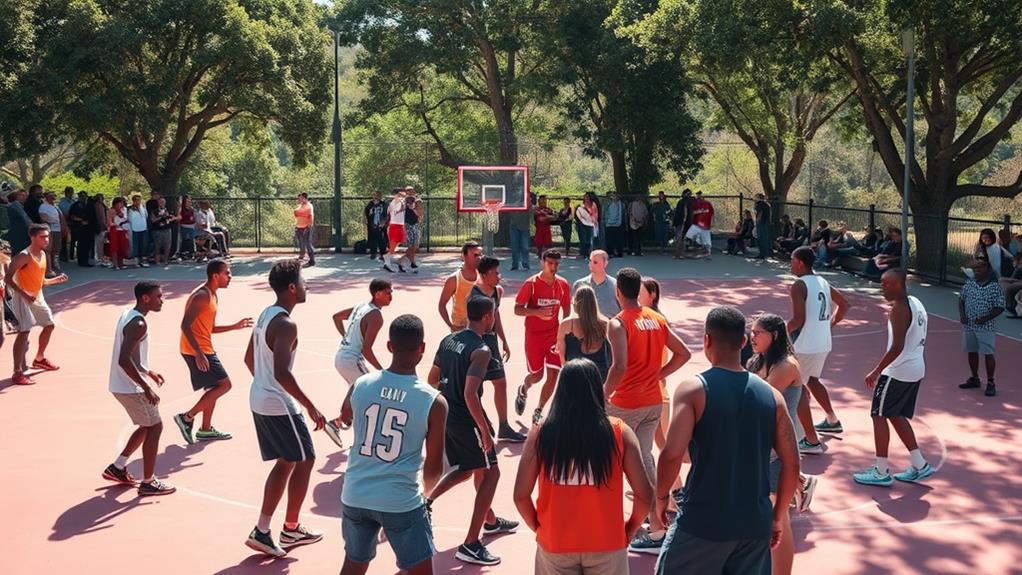
Playing the game of 21 not only sharpens your skills on the court but also weaves strong social ties within the community. The competitive nature of 21 fosters social interaction among players, creating friendships in casual settings like parks or driveways. As you engage in the game, you help build a sense of community, bringing together players of all skill levels.
This inclusivity enhances camaraderie, allowing beginners and experienced players to compete on equal ground. The informal rules of 21 encourage teamwork as players often collaborate on gameplay strategies and rule variations, reinforcing those community bonds.
Regularly playing the game can instill a sense of belonging, making you feel connected to others who share your passion for basketball. Additionally, 21 promotes sportsmanship and respect, as players are responsible for calling their own fouls and maintaining fair play.
In essence, by playing 21, you're not just honing your basketball skills; you're also participating in a vibrant community that values inclusivity, teamwork, and mutual respect. So grab a ball, gather some friends, and enjoy the benefits this game brings beyond the court!
Equipment and Setup Essentials
To plunge into a game of 21, you don't need much—just a basketball and a hoop. This simplicity makes it a favorite among players, whether you're in a park or your driveway. You can use any basketball size—indoor, women's, or youth—so everyone can join in, regardless of age or skill level.
For clarity in scoring, establish a designated free-throw line, typically 15 feet from the basket, and a 3-point line, generally 23.75 feet away. These markers help players understand where to shoot from for different points.
The beauty of 21 is that it can be played on any court size, whether it's a full-size basketball court or a mini-hoop set up in your backyard.
With minimal setup time required, you can gather your friends or family for an impromptu game without needing specialized equipment. Just grab your basketball, find a hoop, and you're ready to start playing.
The freedom to adapt the space and equipment to fit your needs makes 21 a versatile and enjoyable game for everyone involved.
Conclusion
In the game of 21, every shot taken is like a step on a journey, filled with twists and turns. Just like how a well-aimed basket can turn the tide of the game, honing your skills can lead to unexpected victories in life. So, grab a ball, gather your friends, and embrace the challenge. You'll not only improve your game but also forge lasting friendships, proving that every play can lead to something greater off the court.


